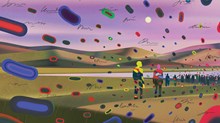Leaders of nine Australian churches have completed a pilgrimage of reconciliation—a week-long 1,900-mile bus trip to Australia's remote heart.The pilgrimage—described as a "pilgrimage to the heart" and a chance for a "just reconciliation between races, cultures and churches"—began on June 4 in the Australian capital, Canberra, where the nation's head of state, the governor-general, Sir William Deane, bid farewell to the pilgrims. The journey wound up seven days later at Uluru (formerly known as Ayers Rock) with an ecumenical Pentecost service in Australia's massive central desert, with the Mutitjulu people, traditional owners of the rock, one of the most powerful symbols of the nation and of indigenous spirituality.The journey came as Australians held the final celebrations for Corroboree 2000, a series of events marking a decade of reconciliation between the nation's indigenous and non-indigenous people. It also coincided with the churches' annual week of prayer for Christian unity. The church leaders' trek began a week after 200,000 people turned out in Sydney to "bridge the gap" between black and white Australians by walking together across the Sydney Harbor Bridge, and ended on the day 55,000 people turned out for a similar walk in Adelaide, a city of just one million people.But it came also at a time of division: Australia's prime minister, John Howard, refuses to apologize to the Aboriginal people for their treatment since white settlement began more than 200 years ago, most notably the forcible removal of Aboriginal children from their families—the "stolen generations"—and their placement with white families in an attempt at assimilation, a process that continued until the 1970s. Prime Minister Howard maintains that today's Australians cannot be held responsible for the mistakes of their predecessors. And polls show that many Australian agree with him—in John Howard's own electorate, the leafy, affluent northern Sydney suburb of Bennelong, 52 percent of those polled believed no apology was necessary. While some Aboriginal people are pushing for a formal treaty between black and white Australians—a process the prime minister has labeled divisive—others believe the country is not ready for one. Others still, such as prominent Aboriginal lawyer Noel Pearson, say that breaking the culture of welfare dependency among indigenous people is more important than any treaty.The director of the church leaders' pilgrimage, Catholic priest Tony Doherty, conceded at the trip's outset that the journey was a symbolic one, but said that sometimes people understood symbols more clearly than conferences, discussion and agendas. "People have likened it to the bus journey in the southern states of America, which addressed the race issue," he told Australian Associated Press. "People have quite extravagantly compared it to the Gandhi salt march," he said, admitting, though, it was really like neither."Just as Sydney walked across the Harbor Bridge," he said, "we would like to think we are putting a bridge across this huge continent."It is a bridge that will take into account a lot of issues, not just the Aboriginal issue, central and important though that is."After the journey, Doherty told ENI it had been an emotional but exhausting trip, one in which there had been reconciliation on the bus and off it.Taking part in the pilgrimage were Archbishop Peter Carnley, Primate of the Anglican Church of Australia; Archbishop Frank Carroll, chairman of the Australian Catholic Bishops' Conference; Pastor Tim Costello, president of the Baptist Union; Pastor Barry Ryall from the Churches of Christ; Commissioner Brian Morgan from the Salvation Army; Pastor John Mavor from the Uniting Church; Pastor Dr Lance Steike, from the Lutheran Church of Australia; Archdeacon Younan Kiwarkis, from the Assyrian Church of the East; and Uniting Church Pastor Shane Blackman, from the Aboriginal and Torres Strait Islander Commission.Each churchman was accompanied by a person under the age of 26."We had the churches bound together on the bus, indigenous people and Anglo-Celts, people from Russia and Iraq, young women from Taiwan," Doherty said."It was quite an unique experience, one of intimacy and story-telling and of the hours and hours we spent together".The trip went from Canberra to Narrandera, on the Murrumbidgee River in New South Wales, to the former mining town of Cobar then to outback towns Wilcannia and Broken Hill and the desert town of Coober Pedy—where many of the homes are built underground and the Serbian Orthodox church has been tunnelled out underneath a slag heap—before heading to Uluru.Along the way, the pilgrims met local people, black and white, and listened to their stories."That's what reconciliation is about, story-telling and listening to stories," Doherty told ENI. The church leaders heard of the hardships of life in the bush, the mine closures, the isolation, the lack of jobs and facilities, and of towns with dwindling populations and uncertain futures.But there was hope, too. Doherty described arriving in the town of Wilcannia and being greeted by the Bakangi indigenous people. "There was a group of local schoolchildren singing with terrific vigor 'I am Bakangi and I'm proud of it,' and punching up into the air."But he admitted that reconciliation was not always the pressing issue for indigenous people. "Frankly, for the Mutitjulu community, I don't think it looms large in their minds," he said. "Their pensions are paid on Wednesday, and they buy food Wednesday, Thursday and Friday, and they go hungry the other four days of the week."We put on a barbecue and the whole town came. The pilgrims couldn't get a sausage and went away hungry, which was a lovely little turning of the tables."He went on: "Reconciliation is about forming new relationships, about breaking down stereotypical hurdles, and trying to make a bridge across fear and unfamiliarity."The more comfortable we are with difference, the more reconciled we are," he said.When would the reconciliation process be over? ENI asked. "When we are a country of justice and peace."Copyright © ENI. Used with permission.
Related Elsewhere
John Herron, Australia's Minister for Aboriginal Affairs, caused a huge outcry in April when he released a report saying, "There never was a generation of stolen children. The proportion of separated Aboriginal children was no more than 10%." For more, see the Sydney Morning Herald's special area on the " stolen generation" controversy.More on Corroboree 2000 and reconciliation between Australia's white and aboriginal populations is available at Yahoo's full coverage area.
Copyright © 2000 Christianity Today. Click for reprint information.

Annual & Monthly subscriptions available.
- Print & Digital Issues of CT magazine
- Complete access to every article on ChristianityToday.com
- Unlimited access to 65+ years of CT’s online archives
- Member-only special issues
- Learn more
Read These Next
- Trending
 Preaching on sex and gender led to local uproar and national headlines. Here are seven things I learned.
Preaching on sex and gender led to local uproar and national headlines. Here are seven things I learned. - From the Magazine
 Fifty years ago, the Lausanne Covenant’s solution to rampant division in evangelical ranks wasn’t uniformity.
Fifty years ago, the Lausanne Covenant’s solution to rampant division in evangelical ranks wasn’t uniformity. - Editor's Pick
 French evangelicals are working together to show people Jesus at 2024 Olympic Games.Français
French evangelicals are working together to show people Jesus at 2024 Olympic Games.Français













